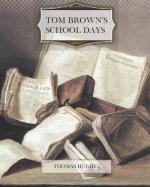“Thomas, do be quick; we shall never catch the Highflyer at Dunchurch.”
“That’s your money all right, Green.”
“Hullo, Thomas, the Doctor said I was to have two pound ten; you’ve only given me two pound.” (I fear that Master Green is not confining himself strictly to truth.) Thomas turns his head more on one side than ever, and spells away at the dirty list. Green is forced away from the window.
“Here, Thomas—never mind him; mine’s thirty shillings.” “And mine too,” “And mine,” shouted others.
One way or another, the party to which Tom belonged all got packed and paid, and sallied out to the gates, the cornopean playing frantically “Drops of Brandy,” in allusion, probably, to the slight potations in which the musician and postboys had been already indulging. All luggage was carefully stowed away inside the coach and in the front and hind boots, so that not a hat-box was visible outside. Five or six small boys, with pea-shooters, and the cornopean player, got up behind; in front the big boys, mostly smoking, not for pleasure, but because they are now gentlemen at large, and this is the most correct public method of notifying the fact.
“Robinson’s coach will be down the road in a minute; it has gone up to Bird’s to pick up. We’ll wait till they’re close, and make a race of it,” says the leader. “Now, boys, half a sovereign apiece if you beat ’em into Dunchurch by one hundred yards.”
“All right, sir,” shouted the grinning postboys.
Down comes Robinson’s coach in a minute or two, with a rival cornopean, and away go the two vehicles, horses galloping, boys cheering, horns playing loud. There is a special providence over school-boys as well as sailors, or they must have upset twenty times in the first five miles—sometimes actually abreast of one another, and the boys on the roofs exchanging volleys of peas; now nearly running over a post-chaise which had started before them; now half-way up a bank; now with a wheel and a half over a yawning ditch: and all this in a dark morning, with nothing but their own lamps to guide them. However, it’s all over at last, and they have run over nothing but an old pig in Southam Street. The last peas are distributed in the Corn Market at Oxford, where they arrive between eleven and twelve, and sit down to a sumptuous breakfast at the Angel, which they are made to pay for accordingly. Here the party breaks up, all going now different ways; and Tom orders out a chaise and pair as grand as a lord, though he has scarcely five shillings left in his pocket, and more than twenty miles to get home.
“Where to, sir?”
“Red Lion, Farringdon,” says Tom, giving hostler a shilling.




